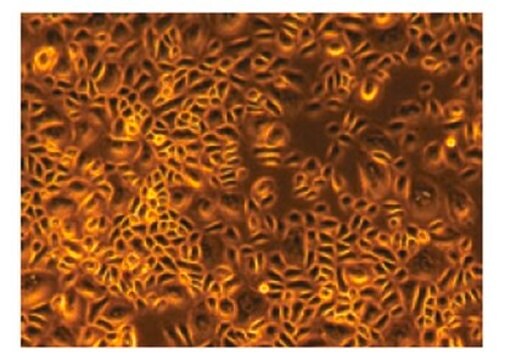10112001
COCA cell line from mouse
Synonyme(s) :
COCA cells
Se connecterpour consulter vos tarifs contractuels et ceux de votre entreprise/organisme
About This Item
Code UNSPSC :
41106514
Nomenclature NACRES :
NA.81
Produits recommandés
Source biologique
mouse skin
Mode de croissance
Adherent
Caryotype
See Segrelles et al 2011
Morphologie
Epithelial
Produits
See Segrelles et al 2011
Récepteurs
Not specified
Technique(s)
cell culture | mammalian: suitable
Conditions d'expédition
dry ice
Température de stockage
−196°C
Origine de la lignée cellulaire
Mouse epidermal keratinocyes, differentiation
Description de la lignée cellulaire
COCA, a murine epidermal cell line was developed by serially passaging keratinocytes from the back skin of adult C57BL/DBA mice. Culture of the COCA cells is in fully defined media without requirement for feeder layer or other coating. COCA retains its ability to differentiate and stratify in response to increased calcium concentrations thus providing an excellent experimental system for in vitro (conventional and 3D epidermal cell cultures) and in vivo (skin regeneration) skin modelling.
Application
For complete product information, please see ECACC
Milieu de culture
CnT-07 media This defined medium contains low calcium (0.07mM). To promote good cell attachment post trypsinisation, an 8-14 hours incubation in CnT-07 medium containing 0.2mM CaCl2 is necessary. Differentiation can be initiated by transferring a confluent monolayer from 0.07mM calcium to high calcium (1.2mM).
Procédure de repiquage
Split sub-confluent cultures (70-80%) 1:3 to 1:6 i.e. seeding at 0.5-1.5 x 104 cells/cm2 using 0.25% trypsin or trypsin/EDTA; 5% CO2; 37°C. It is important to inactivate the trypsin with an equal volume of trypsin inhibitor. To remov
Autres remarques
Additional freight & handling charges may be applicable for Asia-Pacific shipments. Please check with your local Customer Service representative for more information.
Cultures from HPA Culture Collections, supplied by us, are for research purposes only. Enquiries regarding the commercial use of a cell line are referred to the depositor of the cell line. Some cell lines have additional special release conditions such as the requirement for a material transfer agreement to be completed by the potential recipient prior to the supply of the cell line. Please view the Terms & Conditions of Supply for more information.
Code de la classe de stockage
10 - Combustible liquids
Classe de danger pour l'eau (WGK)
WGK 3
Certificats d'analyse (COA)
Recherchez un Certificats d'analyse (COA) en saisissant le numéro de lot du produit. Les numéros de lot figurent sur l'étiquette du produit après les mots "Lot" ou "Batch".
Déjà en possession de ce produit ?
Retrouvez la documentation relative aux produits que vous avez récemment achetés dans la Bibliothèque de documents.
Carmen Segrelles et al.
BMC dermatology, 11, 9-9 (2011-04-23)
Skin diseases are a major health problem. Some of the most severe conditions involve genetic disorders, including cancer. Several of these human diseases have been modelled in genetically modified mice, thus becoming a highly valuable preclinical tool for the treatment
Notre équipe de scientifiques dispose d'une expérience dans tous les secteurs de la recherche, notamment en sciences de la vie, science des matériaux, synthèse chimique, chromatographie, analyse et dans de nombreux autres domaines..
Contacter notre Service technique





